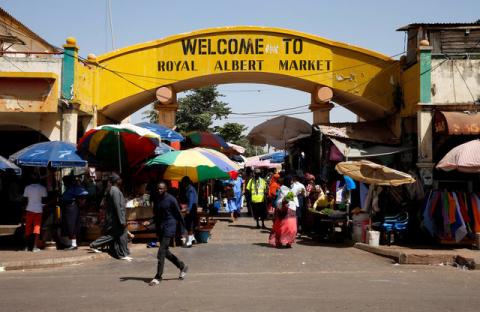Advertisement
In Gambia, relief turns to anger at ex-leader's soft landing
BANJUL (Reuters) - Even before the cheers to celebrate the end of Yahya Jammeh's brutal 22-year rule of Gambia died down, there was fury that he was being allowed to flee into luxurious exile.
Trader Aji Jagne, 32, had chanted "we are free" until her voice was hoarse on Sunday but by the end of the day, less than 24 hours after Jammeh flew out of the country and into exile, her toothy grin had disappeared.
"Why should he escape...? If he ever sets foot in Gambia again, we shall take him to the ICC," she said, referring to the International Criminal Court, from which Jammeh had planned to withdraw before his December 1 electoral defeat.
Celebrations erupted in the streets after West African regional forces entered the capital city, Banjul, and took control of the presidential palace, the State House.
Jammeh, who had refused to accept his poll defeat to opposition challenger and now president Adama Barrow, flew out of Banjul late on Saturday en route to Equatorial Guinea.
A West African regional force had been launched to remove him but paused to allow for negotiations mediated by Guinean President Alpha Conde and President Mohamed Ould Abdel Aziz of Mauritania.
Diplomats and government sources say Jammeh used that time to try to negotiate immunity from prosecution for alleged abuses and, according to an advisor to Barrow, also loaded up a cargo plane with luxury goods.
Jammeh denied allegations of torture and killing opponents while in power. But his repressive rule and a flagging economy saw thousands flee across the Sahara and Mediterranean to Europe each year.
Jammeh, meanwhile, is believed to have acquired a vast fortune, including a fleet of Rolls-Royces with his name embroidered on the headrests and an estate in Potomac, Maryland, a wealthy suburb of Washington, D.C.
While Jammeh left aboard a jet with Conde late on Saturday, two other planes - a Mauritanian aircraft and a cargo plane from Chad - were being prepared for departure on the tarmac, fuelling speculation over their purpose.
It is unclear whether any deal was agreed. Barrow, who is in neighboring Senegal where he is waiting to return to Gambia, denied on Sunday that Jammeh had been offered immunity from prosecution.
Barrow's spokesman Halifa Salah declined to comment further at a news conference.
"DISAPPEARED"
For Jammeh's victims, the notion that he might never face justice and may have even escaped with his treasure is deeply troubling.
Mamudou Sillah was in secondary school when his brother disappeared. Jammeh had only been in power a few months after staging a coup in 1994 when he accused a group of officers of attempting a counter-coup.
Sillah's brother Amadou, a cadet officer, was among them. The last time he saw him was two days before the counter-coup was alleged to have occurred. He had promised to return home.
"He just disappeared. We never saw the body. I heard he was in a mass grave somewhere," he said.
Sillah said he had wanted to see Jammeh arrested at home.
"I was very disappointed when I was told he had gone into exile," he told Reuters. "When he came into power he had nothing. Now he has gone with all that money."
Just how much wealth Jammeh managed to take with him is subject to speculation. Speaking on Sunday to radio station RFM in Senegal, Barrow said that initial inspection indicated Jammeh had looted state resources.
Barrow advisor Mai Ahmad Fatty later told journalists Jammeh had withdrawn 500 million dalasis ($11.51 million) in the past two weeks. He said the Chadian cargo plane was on the tarmac and was ferrying some belongings of the former president.
"We are told it contained luxury goods, lots of expensive vehicles and other stuff," he said late on Sunday.
"We understand that these luxury goods, cars and others, there are still some of them at the airport. We have directed that whatever is at the airport will stay."
Journalists said they witnessed the Mauritanian aircraft take off when Jammeh left.
But with attention focused entirely on the ex-president's departure it was unclear what happened to the cargo plane and what may or may not have been in it. He was not reachable for further comment on Monday.
At the ferry terminal in Banjul on Monday, refugees were streaming back into Gambia from across the river on their way back from Senegal where some 45,000 Gambians fled fearing that Jammeh's refusal to step down would spark violent unrest.
"The ECOMOG (West African force) should have come in without his agreement," said terminal worker Lamine Ceesy, 62.
"Now he's going to escape with all his gold. We need the money back or there's no justice. We want him to go to court."
For Souleyman Ndiaye, a retired businessman who lives across the street from the State House, it could have been worse.
"People are not happy that Jammeh had a good deal," he said, sitting in the shade of a tree outside his house. "But we managed to avoid a war."
(Additional reporting by Emma Farge in Dakar; Editing by Joe Bavier and Sonya Hepinstall)



















Add new comment